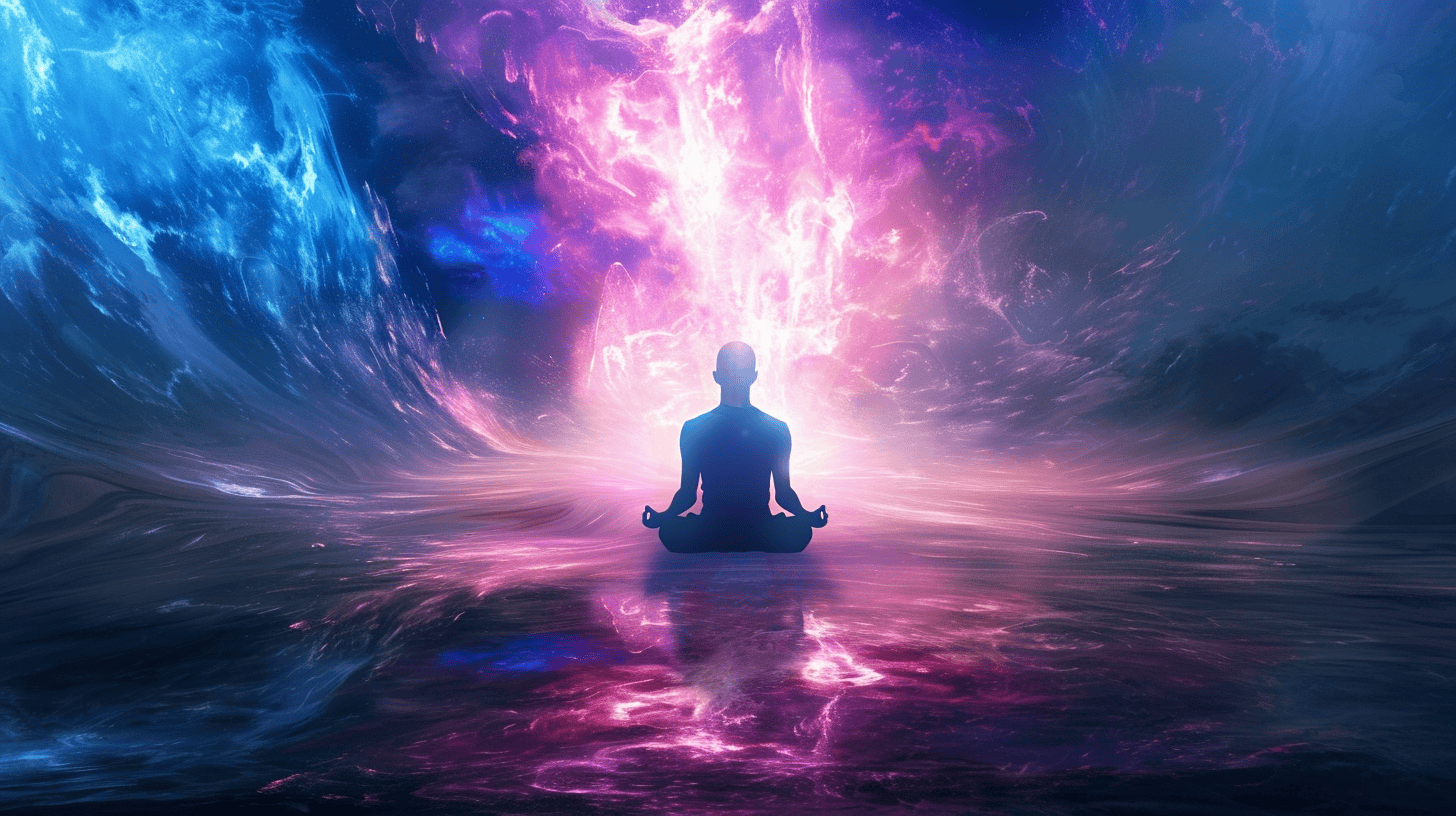It’s 5 a.m., and the world outside is still enveloped in twilight, cradled by the soothing rhythm of your breathing. You’re wide awake before sunrise – seated snugly with eyes shut tight – embarking on a mindful voyage to connect with your inner self.
The truth is as diverse as we are. Each person has a melody that our bodies sway along, and our lives follow an unsynchronized tempo rather than marching to a standard beat. The best time to meditate is in the morning, right after waking up and before starting your day, as this allows you to cultivate calmness and mindfulness to carry through the rest of your activities. This may not always be an option for some of you, though.
So, let’s dig further and look at how you can find your best time for meditation!
Key Takeaways
- Each person has their own unique ideal time for meditation, and it’s crucial to find a regular time that works best for you.
- Consistency in your meditation practice is vital to experiencing its full benefits and deepening your connection with your inner self.
- Morning meditation can set a positive tone for the day by quieting the mind, cultivating gratitude, and increasing energy levels.
- Evening meditation helps relieve stress, promotes reflection and self-discovery, and prepares you for restful sleep.
- Taking a mid-day mental breakthrough meditation can refresh the mind, increase focus and productivity, and bring balance amidst a busy day.
When to Meditate: The Importance of Consistency
Creating a regular meditation habit is crucial for experiencing the full benefits of this spiritual practice. By finding a time that works for you and meditating at the same time each day, you can establish consistency in your practice and deepen your connection with your inner self.
Whether in the morning, evening or even during mid-day breaks, finding your ideal time to meditate will help you cultivate mindfulness and bring peace into your daily life.
Creating a regular meditation habit
I have found joy and peace in making meditation a regular part of my life. Here are my thoughts on how you, too can make this a habit:
- Set time aside each day for meditation. This could be just a few minutes to start with.
- Pick a quiet place where you won’t be disturbed. It helps you focus.
- Use helpful tools like a meditation app or timer.
- Be patient with yourself as your mind wanders at first; this is normal.
- Stay aware of the changes in your body and mind as you meditate more often.
- Please take note of your feelings and thoughts after each session; it helps track your progress.
- Be ready for days when it will seem complicated to find quiet; that’s okay!
- Remember that even small amounts of meditation can help improve quality of life.
Finding a time that works for you
Picking the right time for your meditation makes a big difference. It’s crucial to find when you feel most calm and ready. Some people like the quiet of early morning before the day gets busy.
Others prefer their lunch break or after work in the evening to unwind from a long day. Remember, there’s no wrong choice but you may find the most benefit after waking!
The goal is to pick a regular time that fits seamlessly into your daily life. The most important thing is to stick to it. Each day is best at the same time.
This way, meditation becomes something you look forward to, not another task on your checklist!
Benefits of meditating at the same time each day
Meditating at the same time each day packs a punch of benefits. Aim to stick to your chosen meditation time. You will see amazing changes in yourself.
- Meditating daily at the same time forms a habit.
- Consistent meditation can help you tune into your inner self.
- A fixed time each day for meditation cuts down on distractions.
- This practice makes us more focused.
- The same-time routine increases our commitment to meditate.
- It improves our discipline.
- Consistency boosts the overall experience and effectiveness of meditation.
The Power of Morning Meditation

Starting your day with a morning meditation can have a powerful impact on your overall well-being. By taking the time to quiet your mind and connect with your inner self before the hecticness of the day begins, you can set a positive tone for the rest of the day.
Morning meditation allows you to clear any opposing thoughts or anxieties that may have accumulated overnight and instead cultivate gratitude and positivity. It is also an opportunity for self-reflection and setting intentions for the day ahead.
Consider incorporating a morning mindfulness meditation into your daily routine to reap these benefits and start each day on a centered and peaceful note.
Quieting the mind before the day begins
In the morning, before the day gets busy, taking a few moments to meditate can be really helpful. It’s a great way to quiet your mind and set a positive tone for the day ahead. By sitting quietly and focusing on your breath or repeating a mantra, you can bring more calm and peace into your mind and body.
Morning meditation also allows you to practice gratitude, which is thinking about things that you are thankful for in your life. This helps shift your mindset towards positivity and increases feelings of happiness throughout the day.
Plus, starting your day with meditation can increase energy levels and improve concentration, making it easier to tackle any challenges that may come your way. So why not give it a try tomorrow morning? You might find that it becomes one of the best parts of your daily routine!
Setting a positive tone for the day
When we start our day with morning meditation, we can set a positive tone for the entire day. This practice allows us to quiet our minds before the busyness and challenges of the day begin.
By taking this time for ourselves in the morning, we can cultivate a sense of calm and inner peace that stays with us throughout the day. Morning meditation also allows us to practice gratitude and set clear intentions for how we want our day to unfold.
Even just five minutes of meditation in the morning has been shown to reduce stress and anxiety and promote a more focused and productive mindset. It’s an empowering way to begin each new day by connecting with our inner self and creating a positive foundation for everything else that follows.
Practicing gratitude
Gratitude meditation is a powerful practice that involves focusing on and expressing gratitude for the things and people we are thankful for. It helps shift our focus towards the positive and can significantly improve our happiness and well-being.
Research shows that gratitude meditation has a positive impact on both our mental and physical health, including conditions like high blood pressure, anxiety, and depression. By regularly practicing gratitude through meditation, we can cultivate a sense of appreciation even on difficult days.
So take a moment each day to reflect on what you are grateful for – it’s a simple yet effective way to enhance your spiritual journey.
Evening Meditation: Unwinding and Reflecting
Evening meditation is a time to let go of the day’s stresses, reflect on your experiences, and prepare for restful sleep. It allows you to unwind and find peace before bedtime.
To learn more about the benefits of evening meditation and how to incorporate it into your daily routine, read on.
Letting go of the stresses of the day
In the evening, meditation can help us let go of the stresses and worries from our day. It allows us to unwind and relax, creating a space for peace and tranquility. By taking a few moments to sit quietly and focus on our breath, we can release tension in both our body and mind.
This practice helps us to find inner calmness and clarity before we prepare for restful sleep. Letting go of the day’s stresses through evening meditation sets the foundation for a peaceful night’s rest, allowing us to wake up refreshed and rejuvenated in the morning.
Reflection and self-discovery
Sitting in quiet meditation, I feel a deep peace and calm. This is my time for reflection and self-discovery, where I can genuinely connect with my inner self. Through this practice, I can gain insight into my thoughts, feelings, and emotions without judgment or bias.
It allows me to explore the depths of my being and uncover hidden truths about myself. By taking the time to reflect and go inward, I can cultivate a greater understanding of who I am and what truly matters to me in life.
This process of self-reflection has been transformative for me, helping me on my spiritual journey toward personal growth and enlightenment.
Preparing for restful sleep
Incorporating evening meditation into your nightly routine can significantly improve the quality of your sleep. By calming your mind and letting go of the day’s stresses, you create a peaceful state that promotes restful sleep.
You can also practice specific forms of guided meditation, such as Yoga Nidra, which have been proven to reduce sleeplessness. Making sleep meditation a regular habit allows you to enhance your overall sleep experience and wake up refreshed and rejuvenated.
Additionally, evening meditation has been shown to enhance willpower and self-control, making it easier for you to maintain healthy habits throughout the day.
Mid-Day Meditation for a Refreshed Mind
Taking a mental break during a busy day can improve your overall well-being. Mid-day meditation allows you to step away from the demands of work or other responsibilities and find a moment of peace and calm.
By setting aside even just 10 minutes during your lunch break, you can recharge your mind, increase focus and productivity, and find balance amidst the chaos. Consider finding a quiet space where you won’t be interrupted, close your eyes and focus on your breath, or use guided meditation techniques to help you through the practice.
Taking a mental break during a busy day
During a busy day, it can be essential to take a break and clear your mind. Mid-day meditation is a great way to do this. Here are some benefits of taking a mental break with mid-day meditation:
- Refreshing the mind: Mid-day meditation allows you to escape the demands and stresses of work or school. It gives your mind a chance to rest and recharge.
- Increased focus and productivity: Taking a break to meditate can actually help improve your focus and concentration when you return to your tasks. It clears your mind of clutter and helps you stay focused on what’s important.
- Finding balance and calm: On a busy day, it’s easy to feel overwhelmed or stressed. Mid-day meditation provides an opportunity to find balance and calm amidst the chaos. It allows you to center yourself and approach the rest of the day with clarity.
Increasing focus and productivity
When I meditate in the middle of the day, it helps me to stay focused and productive. Taking a mental break from my busy schedule lets me clear my mind and recharge. It’s better how just a few minutes of meditation can improve my ability to concentrate and get things done.
Research has shown that regular meditation practice can actually improve focus, memory, and mental clarity. Iff you’re feeling overwhelmed or finding it hard to stay on task, I highly recommend incorporating mid-day meditation into your routine.
Trust me, you’ll be amazed at the positive benefits it brings to your productivity levels.
Finding balance and calm

For me, finding balance and calm through meditation has been a transformative experience. Taking the time to connect with my inner self and quiet my mind has brought peace and emotional well-being into my life.
I’ve discovered that the best time to meditate is in the morning before the day gets busy. It sets a positive tone for the day ahead and helps me practice gratitude. In the evening, meditation allows me to let go of any stresses or worries from the day and reflect on myself.
And when I need a mental break during a busy day, midday meditation brings focus and productivity back into my life. By listening to my body’s energy levels and tuning in to what I need, I can tailor my meditation practice accordingly.
Listening to Your Body and Mind
Tuning into your body and mind is crucial when it comes to finding your ideal time for spiritual meditation. Each person’s energy levels and needs can vary, so it’s essential to listen to what your body and mind are telling you.
Pay attention to how you feel throughout the day and identify when you need a moment of stillness and reflection. By tuning in, you can discover when the best time is for you to meditate based on your current state.
Whether during a break in the middle of a busy day or before bed when you need to unwind, listening to your body and mind will guide you toward the optimal time for connecting with your inner self through meditation.
Tuning into your energy levels
To find the best time for spiritual meditation, it’s essential to tune into your energy levels. By listening to your body and mind, you can determine when you feel most calm and centered.
This will help you connect with your inner self more effectively during meditation. Understanding your energy levels allows you to choose how you experience each moment of your life, from morning to evening.
Tuning into your energy also involves recognizing any spiritual guidance that may guide you toward certain times for meditation. So, take a moment to check in with yourself and find the ideal time for your spiritual practice.
Identifying when you need to meditate
To connect with your inner self through meditation, it’s crucial to identify the best time to meditate. This means listening to your body and mind, tuning into your energy levels, and recognizing when you need a moment of stillness and calm.
The ideal time for spiritual meditation can vary from person to person, so it’s crucial to find what works best for you. Some people prefer morning meditation to quiet their minds before the day begins and set a positive tone.
Others find that evening meditation helps them unwind from the day’s stresses and reflect on their experiences. And some may benefit from mid-day meditation as a mental break amid a busy schedule.
Tailoring your meditation to your current state
When it comes to meditation, it’s essential to listen to your body and mind. Tailoring your meditation practice to your current state can help you get the most out of your sessions.
Maybe you’re feeling tired and need a gentle guided meditation to relax. Or perhaps you’re energized and want a more active mindfulness practice. By tuning in to how you’re feeling physically and emotionally, you can choose the right type of meditation that aligns with your needs in that moment.
This way, you can fully engage with the practice and experience its positive benefits for reducing stress, finding inner peace, and promoting overall well-being. So remember, take the time to assess how you’re doing before each session and adjust accordingly for a more personalized meditation experience.
Example: Personally, there have been times when I’ve felt overwhelmed by stress or anxiety before starting my meditation practice. In those moments, I’ve found that choosing a calming, guided visualization helped me release tension and find a sense of calmness within myself.
Combining Meditation with Other Activities
– Meditating before or after exercise can enhance your physical and mental well-being. It helps connect your mind and body, allowing for a more profound meditation experience. Plus, it can help improve your focus during exercise.
– Meditating during your lunch break is a great way to recharge and refresh your mind during a busy day. Just find a quiet spot, close your eyes, and take a few moments to center yourself.
– Incorporating movement into your meditation practice, such as walking meditation or yoga, can help enhance mindfulness and bring more awareness to the present moment.
To learn more about how combining meditation with other activities can deepen your spiritual practice, read the full article here [insert link].
Meditating before or after exercise
Combining meditation with exercise is a great idea. It’s essential to find your ideal time for spiritual meditation, and meditating before or after exercise can be perfect for some people.
Doing this helps you incorporate mindfulness into your physical activity routine, allowing you to connect with your inner self while taking care of your body. Whether it’s a calming session before hitting the gym or a reflective practice after a workout, meditating in conjunction with exercise can enhance both experiences and bring more balance to your overall well-being.
Meditating during lunch break
During my journey of spiritual exploration, I discovered the power of meditating during my lunch break. It’s a simple yet effective way to find inner peace and reduce stress during a busy day.
Just taking 5 minutes to slow down, focus on my breath, or do a quick guided meditation has made a significant difference in how refreshed and centered I feel afterward. And if I have more time available, I can always extend my meditation practice to deepen the experience.
The great thing about meditation is that it can be practiced whenever you need it most. Whether you’re feeling overwhelmed or want to take a few moments for self-care, meditating during your lunch break provides a fast and accessible way to alleviate stress and reconnect with your inner self.
Incorporating movement into your meditation practice
Incorporating movement into your meditation practice can be a fantastic way to enhance your spiritual journey. Mindful movement meditation allows you to connect with your inner self and cultivate self-awareness.
By combining gentle physical movements, such as yoga or walking meditation, with mindful attention, you can deepen your meditation experience and bring more presence to the present moment.
This can help release tension in the body, quiet the mind, and promote a sense of calm and tranquility. So whether it’s through gentle stretches, flowing yoga sequences, or mindful walking in nature, adding movement to your meditation practice can bring a new dimension of mindfulness and connection to your spiritual exploration.
Overcoming Obstacles to Consistent Meditation
Consistency is key when it comes to maintaining a regular meditation practice. However, there are often obstacles that can hinder our ability to meditate consistently. In this section, we will explore some common obstacles and provide strategies for overcoming them.
Lack of time is one of the most common challenges people face when establishing a consistent meditation routine. Many individuals lead busy lives with demanding schedules, making it difficult to find dedicated time for meditation.
In these cases, it can be helpful to prioritize self-care and carve out small pockets of time throughout the day for meditation. Even just five minutes in the morning or during a lunch break can make a significant difference.
Another obstacle that may arise is related to mindset and beliefs about meditation. Some individuals may feel skeptical about the benefits of mediation or doubt their ability to meditate effectively.
It’s important to approach these doubts with an open mind and permit yourself to embrace the practice without judgment or expectations fully. Additionally, setting realistic goals and acknowledging progress along the way.
Lack of time
I understand that many people struggle with finding time to meditate regularly. It’s a standard barrier that can make it challenging to incorporate meditation into your daily routine.
Some individuals feel like they don’t have enough time in their busy schedules to dedicate to meditation. However, it’s important to remember that even just a few minutes of meditation each day can make a difference in your spiritual practice.
You don’t need hours of free time to experience the positive benefits of meditation. By prioritizing and making minor adjustments in your schedule, you can create pockets of time for moments of stillness and self-reflection.
Mindsets and beliefs that may hinder your practice
Sometimes, our beliefs and thinking can get in the way of consistent meditation. We may think that we don’t have enough time or that it’s not important enough to prioritize.
These mindsets can hold us back from experiencing the many benefits of regular meditation. It’s important to challenge these limiting beliefs and remind ourselves that making time for spiritual practices is essential for our well-being.
By recognizing and adjusting these negative thoughts, we can create a positive mindset that supports our meditation practice and helps us overcome any obstacles we may face.
Adjusting your routine as needed
Adjusting your routine as needed is an essential aspect of establishing a consistent meditation practice. Here are some tips to help you integrate meditation into your daily life:
- Start with small increments: If you’re new to meditation, begin by setting aside just a few minutes each day. Gradually increase the duration as you become more comfortable and confident in your practice.
- Find pockets of time: Look for moments throughout your day where you can squeeze in a quick meditation session. It could be during your lunch break, before or after exercise, or while waiting for appointments.
- Prioritize self-care: Make self-care a priority and carve out dedicated time for meditation. Treat it as an essential part of your daily routine, like brushing your teeth or eating meals.
- Be flexible with the time of day: Experiment with different times of the day to find what works best for you. Some people find that meditating first thing in the morning helps them set a positive tone for the day, while others prefer to unwind with evening meditation before bed.
- Listen to your body and mind: Pay attention to how you feel throughout the day and tune into what your body and mind need. If you’re feeling stressed or overwhelmed, take a moment to pause and meditate, even if it’s just for a few minutes.
- Adjust based on circumstances: Life can be unpredictable, and there may be days when sticking to your usual meditation routine becomes challenging. Instead of getting discouraged, adapt to the circumstances and find alternative ways to incorporate mindfulness into your day.
Conclusion on the Best Time for Spiritual Meditation
In conclusion, finding your ideal time for spiritual meditation is a personal journey. It’s important to create a regular meditation habit and find a time that works for you. Whether it’s morning, evening, or mid-day, the key is to listen to your body and mind and tailor your meditation to your current state.
By incorporating meditation into your daily routine and overcoming obstacles, you can connect with your inner self and experience the many benefits of this practice. So take time each day for yourself, quiet your mind, and connect with the divine within you.
FAQ on Finding the Best Time to Meditate
Q: What is the best time to meditate?
A: The best time to meditate can vary depending on individual preferences and schedules. Some people find that meditating first thing in the morning helps them start their day with a clear and focused mind. Others prefer meditating in the middle of the day as a way to reset and recharge. Ultimately, it is important to find a time that works best for you.
Q: Why is the best time to meditate in the morning?
A: Many meditation experts concur that meditating in the morning has several benefits. First, it allows you to start your day with a sense of calm and clarity. It also helps you establish a consistent meditation practice by making it a part of your daily routine. Additionally, meditating in the morning can set a positive tone for the rest of the day and help you approach challenges with a more centered and mindful mindset.
Q: Is it better to meditate at the same time every day?
A: Establishing a regular meditation schedule can be beneficial for developing a consistent practice. Meditating at the same time every day helps train your mind and body to settle into a meditative state more easily. It also helps create a sense of discipline and commitment to your meditation practice. However, if your schedule does not allow for the same time every day, it is still beneficial to meditate whenever you can find the time.
Q: What is the best time of day to meditate?
A: The best time of day to meditate can vary depending on individual preferences and circumstances. Some people find that meditating in the morning before the demands of the day begin is ideal for setting a positive tone. Others prefer meditating during the middle of the day as a way to re-energize and refocus. Ultimately, it is important to choose a time that works best for you and allows you to dedicate uninterrupted time to your meditation practice.
Q: Does the best time to meditate depend on your lifestyle?
A: Yes, the best time to meditate can depend on your lifestyle and daily routine. It is important to choose a time that aligns with your schedule and allows you to dedicate a consistent and uninterrupted period for meditation. For some, this may be early in the morning before other responsibilities arise. For others, it may be during a break in the middle of the day or in the evening before bed. Experiment with different times to find what works best for you.
Q: What are the benefits of meditating in the morning?
A: Meditating in the morning can have several benefits. It helps you start your day with a calm and focused mind, allowing you to approach your daily tasks with greater clarity and efficiency. It sets a positive tone for the rest of the day and helps you maintain a sense of mindfulness and presence. Additionally, meditating in the morning can enhance your overall well-being and reduce stress levels.
Q: Is there an ideal time to meditate for spiritual practices?
A: The ideal time to meditate for spiritual practices can vary depending on personal beliefs and traditions. Some spiritual traditions suggest meditating early in the morning, as it is believed to be a time when the energy is most conducive to spiritual growth and introspection. However, the concept of an ideal time can be subjective and may vary based on individual preferences and spiritual beliefs.
Q: Should beginners meditate in the morning?
A: Beginners can benefit from meditating in the morning as it helps establish a consistent practice and sets a positive tone for the day. Starting your day with meditation can also help beginners develop a habit and make it easier to incorporate meditation into daily life. However, if the morning doesn’t work for you, it is perfectly fine to choose a different time that aligns better with your schedule and lifestyle.
Q: What is the best time to practice meditation?
A: The best time to practice meditation is a personal preference and can vary from person to person. Some people find that meditating in the morning helps them set a positive tone for the day, while others prefer meditating in the evening to unwind and relax before bed. Experiment with different times and choose the time that allows you to be fully present and dedicated to your meditation practice.
Q: What’s the best time for a daily meditation session?
A: The best time for a daily meditation session can vary depending on individual schedules and preferences. For many, meditating in the morning before starting the day is ideal as it sets a positive tone and helps cultivate mindfulness. However, some people may find that meditating in the evening or during a lunch break works better for them. The key is to choose a time when you can dedicate uninterrupted time to your daily meditation practice.





Leave a Reply